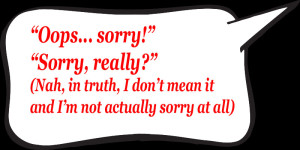 We bump into someone, “Oh, sorry!”
We bump into someone, “Oh, sorry!”
A clerk in the store is asked by a customer if they have an item that isn’t carried, “Sorry, we don’t carry that.”
Your grandmother died, “I’m so sorry for your loss.” – a legit “I’m sorry”
My young kids are fighting, “Say you’re sorry to each other!” I command. “Sorry” one mutters. “Sorry” the other shoots back quickly. “No, say it like you MEAN it!” I demand.
Saying “I’m sorry” seems to be painfully hard for some people to say, while overdone by others. To admit to erring – brave or foolish? Ego aside, saying you’re sorry is not so hard, especially when you don’t really mean it. For some, saying “sorry” can just be a bad habit.
A client once apologized repeatedly for minor things that were not her fault (“sorry your bus was delayed”, “sorry you bumped your shin”, “sorry that chair is taken”) until I pointed out to her that she had a “sorry” habit. She couldn’t even hear herself saying it until she started to pay attention.
Saying you’re sorry occurs so often for some people that it’s become habitual. And it’s not necessarily a good habit to have. It’s nice to be polite and apologize when you’ve either offended someone, or bumped into them, but when the words come rushing out and you find yourself apologizing to the lamp post when you turn around, you know that the habit has become foolish.
Why is this not a great habit to have? For one thing, when you say “sorry” as an automatic reflex, you don’t really mean it. It’s just what you say because you’re conditioned to say it. And when we toss out a word that we don’t really mean, that’s not an authentic display of character – polite, yes, but still disingenuous, just like my kids apologizing to each other when they don’t mean it. So why say it at all, except it’s a socially acceptable thing to say, and heavens knows we want to fit in; being polite is a good way to get there.
Another reason why you should drop the sorry habit is because of the way language affects internal beliefs. To be truly sorry is to admit culpability; you are wrong or have wronged someone somehow, for which you are remorseful. When we say sorry over and over again, when it has nothing to do with us, we carry around the inferred blame, which can internalize into feeling like the kind of person who is blameworthy and deserves to need to ask for others’ forgiveness. For nothing! Not your fault, so stop apologizing.
When I was in high school, Joan would apologize repeatedly for a minor transgression. She was in the wrong, but somehow she just couldn’t let it go until she had brought it up and apologized so often to the point of discomfort. Once – apology accepted. Twice – OK I get that you’re taking responsibility for your actions. Even three times shows how deeply you care. But by the 20th “I’m sorry” I’m avoiding you and your serious self-esteem problem, which is grating on my nerves to hear it over and over and over and….
Women apologize much more than men do. It’s not in our nature to be doormats. However it is in our nature to try to smooth things over and keep everything harmonious. And it’s in the nature of problem-solving men to point out to us, “What are you apologizing for? It’s not your fault that the bus was late; it had nothing to do with you.” “What I mean is that I’m sorry you had to wait…” Stop right there, now an explanatory apology? Change immediately to, “That’s unfortunate.” Just as polite, and no apology needed.
When we apologize “sorry” by itself really means, “that’s too bad”, without the personalization. When we truly are at fault, an “I’m sorry” is called for, with the personalization. The former needs to be eliminated, since there are lots of other words to use to get across the same idea. (i.e.“Oh, I believe that chair is taken.”) Remember the mental damage the sorry habit does and stop doing that to yourself, if you are indeed the sorry type. There is power in words, especially words that you repeat over and over again.
I’m sorry to tell you this, but the sorry habit needs to be kicked, Joan.
Comment about any Joans you have known.
